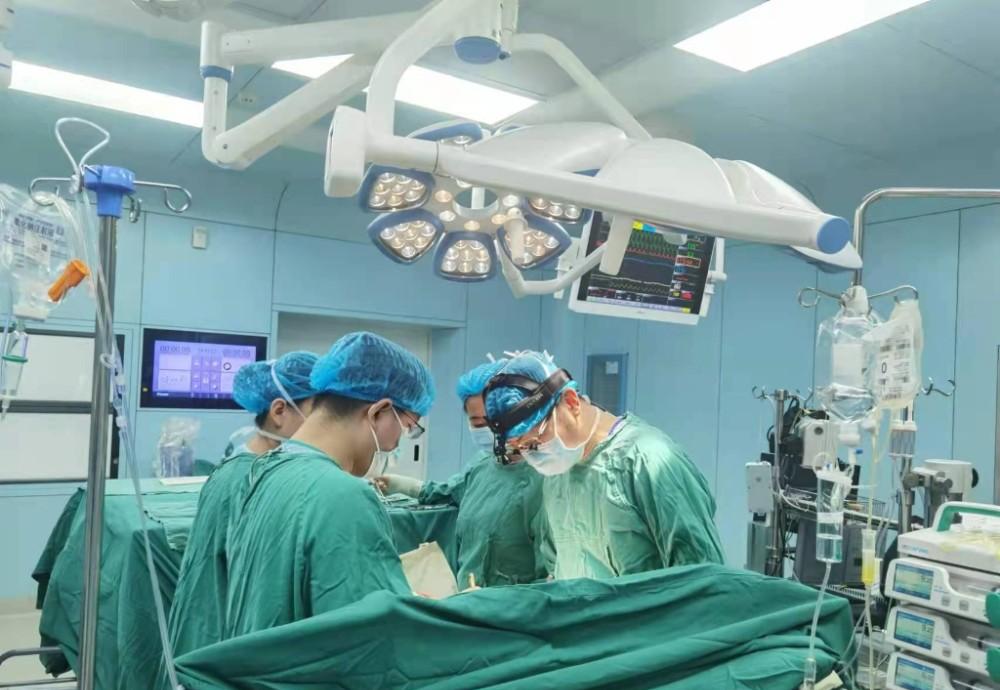
Surgical scene. Heavy Medicine Children's Hospital Courtesy of Hualong Network - New Chongqing Client Issued
Hualong Network - New Chongqing client January 10, 16:00 news (reporter Lian Xiao correspondent Yuan Ruqing) from Dazhou, Sichuan, 10-year-old girl Jia Jia (pseudonym), surprisingly 10 centimeters shorter than her twin sister. It turned out that she had a rare complex congenital heart disease – a right ventricular double outlet (a ventricular septal defect far from two major arterial subtypes). Recently, she successfully underwent surgery in the Department of Thoracic and Cardiac Surgery at The Children's Hospital of The Heavy Medicine and was discharged from the hospital.
According to Jia Jia's mother, Jia Jia was diagnosed with congenital heart disease when she was 3 months old, and the doctor at the time told her that the disease could heal on its own as the child grew older. However, in the process of growing up, Jia Jia's height and weight gradually distanced themselves from her twin sisters. Today, the 10-year-old Jiajia is thin and weighs only 23 kilograms, which is not as good as the weight of a normal 8-year-old child, and her height is 10 centimeters shorter than her sister.
In the winter of 2021, Jia Jia developed a coma, breathing difficulties, was diagnosed with acute heart failure, and was dying. Since then, he has been transferred to the Children's Hospital Affiliated to Chongqing Medical University.
In Chongqing, Jia Jia was diagnosed with a rare complex congenital heart disease – the right ventricle double exit. The doctor explained that the pulmonary artery of normal people emanates from the right ventricle and the aorta from the left ventricle, but Jiajia's arterial blood vessels "go the wrong way", the aorta and pulmonary arteries are emitted from the right ventricle, and at the same time, a huge ventricular septal defect and severe pulmonary hypertension are combined. Your child's ventricular and aortic connections are malformed, and the ventricular septal defect is far from both major arteries.
Li Yonggang, deputy director of the department of thoracic and cardiac surgery at the hospital, said that the double exit of the right ventricle is a rare complex congenital heart disease, and 3 to 9 children may have this disease in every 100,000 children, and this type of congenital heart disease accounts for only 1%-3% of children with congenital heart disease. The child's ventricular septal defect is far away from the two major arterial subtypes, and it only accounts for 10% of the children with double outlets in the right ventricle.
The doctor said that the best time for Jiajia's surgery should be in infancy, and now Jiajia's condition has been delayed until the age of 10, pulmonary hypertension is severe, and the risk of surgery is extremely high.
Li Yonggang and the team analyzed that although the child's pulmonary hypertension is very high, fortunately, the results of the cardiac catheterization test show that the child's pulmonary vascular resistance is not too high, and there is still a chance of surgery. Through full communication with the family, the doctor decided to give it a go. Based on the comprehensive assessment of the intraoperative exploration, Professor Li Yonggang decided to perform radical double ventricular dissection surgery for Jiajia.
The operation lasted 5 hours, and when Jiajia's heart returned to beating, all the medical staff were ecstatic. 10 days after the operation, Jia Jia recovered and was discharged from the hospital. The doctor believes that she will be able to live and study like a normal child in the future.
Professor Li Yonggang reminded parents that if they find that their children's lips are purple, growth and development retardation, dislike of activity, fatigue, palpitations after activities, chest tightness, etc., they must be vigilant against heart diseases. If your child is diagnosed with complex congenital heart disease, it is recommended to take your child to a hospital with extensive experience in the diagnosis and treatment of congenital heart disease in children as much as possible, so as not to delay the best time for surgery.
(This article is from the new Chongqing client APP, please go to the major application markets to download)